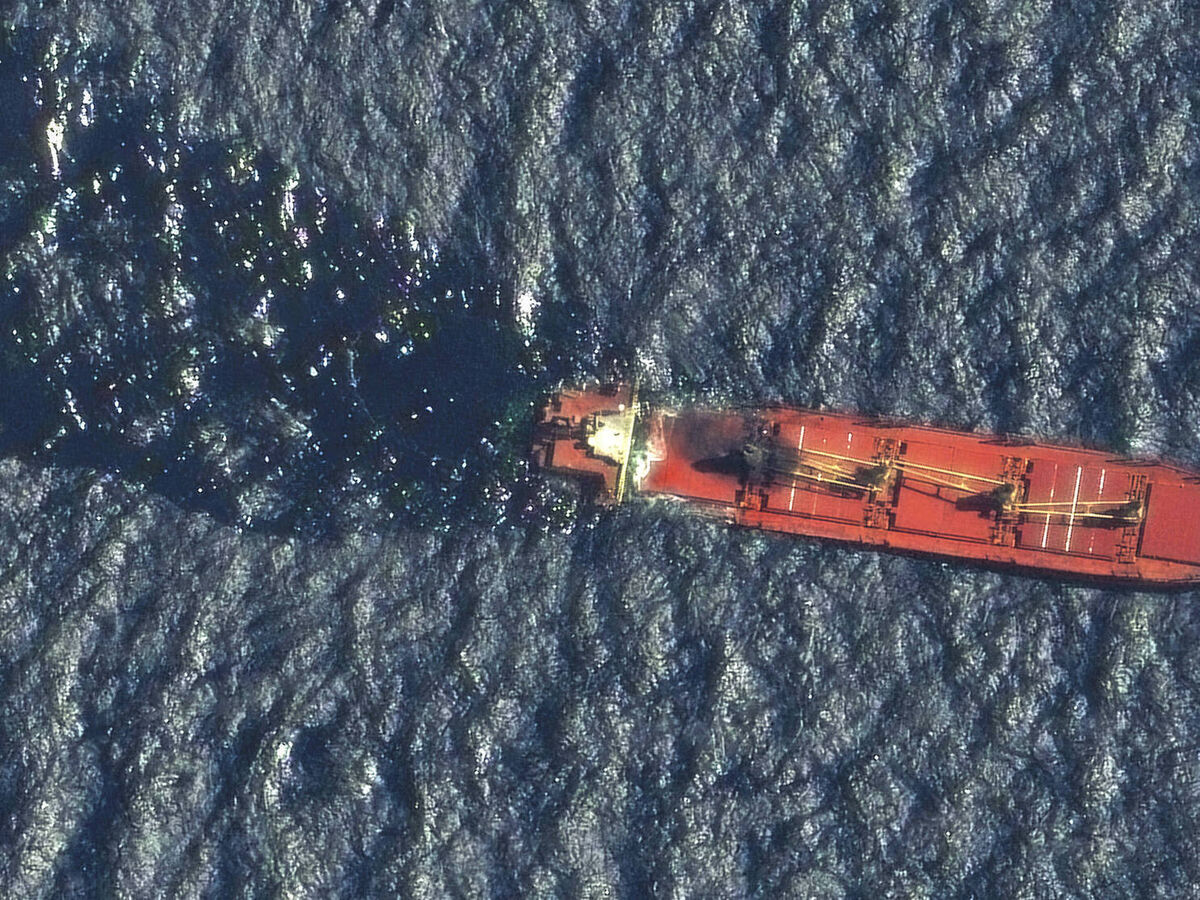Renewed Houthi Strikes in Red Sea Raise Global Tensions as Cargo Ship Attacked: Crew Members Hurt and Missing
Red Sea – July 8, 2025
A Liberian-flagged cargo ship came under a fierce and coordinated assault late Monday, July 6, in the Red Sea, leaving two onboard security guards injured and two others reported missing. The attack, allegedly carried out by Yemen’s Houthi rebels, came just a day after the same group claimed responsibility for the sinking of the Magic Seas, another Liberian-flagged, Greek-owned bulk carrier.

According to maritime security firm Ambrey, the vessel was northbound toward the Suez Canal when it was attacked by small boats and bomb-laden drones. Armed security personnel onboard returned fire during the attack. The vessel’s engines were reportedly disabled, causing it to drift in the water. Ambrey noted the presence of casualties among the ship’s security team but did not confirm the vessel’s current status.
The assault has been acknowledged by the United Kingdom Maritime Trade Operations (UKMTO), which monitors ship movements and threats in the region. Though Yemen’s Houthi-run al-Masirah news channel referenced the incident, the rebels have not formally claimed responsibility. However, Moammar al-Eryani, information minister for Yemen’s internationally recognized government, blamed the Houthis directly for the strike.
The U.S. military’s Central Command stated that it was aware of the reports but declined to offer further comment.
The latest attack follows a dramatic and dangerous assault on Sunday, July 5, on the Magic Seas, a bulk carrier bound for Egypt via the Suez Canal. The ship came under intense fire — including missiles, drones, rocket-propelled grenades, and small arms — approximately 100 kilometers southwest of Hodeida, a key port controlled by the Houthis.
A European Union naval mission, Operation Atalanta, confirmed that all 22 crew members onboard were forced to abandon ship and were subsequently rescued by an Abu Dhabi Ports vessel dispatched from the United Arab Emirates. The Houthis later claimed responsibility, with military spokesman Brig. Gen. Yahya Saree declaring the use of “missiles and bomb-carrying drone boats” in the strike.
Saree further claimed that the ship had sunk by Monday. The owners of the Magic Seas have not responded to requests for comment.
The recent spike in maritime attacks has stirred fears of a renewed Houthi campaign against commercial shipping in one of the world’s busiest trade corridors. The timing of these assaults is particularly sensitive: diplomatic efforts for a ceasefire in the Israel-Hamas war are underway, Iran is considering a return to nuclear negotiations, and Israeli Prime Minister Benjamin Netanyahu met with former U.S. President Donald Trump on Monday at the White House.
These tensions have been further exacerbated by Israel’s aggressive military posture in response to Houthi actions. Early Monday, the Israeli military launched multiple airstrikes on Houthi-held ports in Yemen — including Hodeida, Ras Isa, and Salif — as well as a power plant in Ras Kanatib. The military said the ports were being used by Iran to supply the Houthis with weapons, including radar systems to track maritime targets.
One of the Israeli strikes reportedly targeted the Galaxy Leader, a vehicle carrier seized by the Houthis in November 2023. Israeli officials alleged the ship had been outfitted with radar equipment used to assist in further attacks.
Israeli Defense Minister Israel Katz issued a stern warning Monday, stating, “What’s true for Iran is true for Yemen. Anyone who raises a hand against Israel will have it cut off. The Houthis will continue to pay a heavy price for their actions.”
Following the strikes, the Houthis launched what appeared to be a retaliatory missile attack against Israel. Israeli military sources confirmed they attempted to intercept two incoming missiles, though both reportedly made impact. No injuries or fatalities were reported.
Brig. Gen. Saree later confirmed the rebels had fired missiles and drones toward Israel as part of what he described as a broader operation to halt maritime movement tied to Israel and to pressure the cessation of the Gaza offensive.
Since November 2023, the Houthis have launched over 100 attacks on merchant vessels in the Red Sea using drones, missiles, and explosive-laden boats. These assaults have disrupted nearly $1 trillion worth of annual global trade that passes through the corridor, causing significant rerouting and increased insurance premiums for shipping lines.
The recent attacks marked the Houthis’ return to targeting commercial vessels after a relative lull. From March to June 2025, following a U.S.-led aerial bombardment campaign that killed dozens of Houthi fighters and damaged infrastructure, attacks subsided. But with the latest assaults on Magic Seas and the unidentified Liberian-flagged ship, the rebels appear to have resumed their maritime offensive.
Analysts fear the revival of Houthi operations could again force the U.S. and its allies to intervene. During his presidency, Donald Trump launched a broad airstrike campaign against Houthi targets. His potential return to office or increased political influence could mean a repeat of similar policies.
The attacks have introduced a new level of uncertainty into an already volatile regional equation. The nexus of Yemen’s Houthi insurgency, Iran’s nuclear brinkmanship, Israel’s continuing war in Gaza, and U.S. political shifts creates an explosive backdrop for the Red Sea conflict.
Maritime security experts are now warning that unless diplomatic efforts succeed in bringing a ceasefire to Gaza and engaging Iran, the Red Sea corridor could once again become a battleground, jeopardizing vital trade routes and global supply chains.
For now, commercial vessels continue to navigate the corridor under constant threat, with shipping companies, navies, and political leaders watching anxiously for the next move in what appears to be a rapidly widening conflict.
Author: shipping inbox
shipping and maritime related web portal









